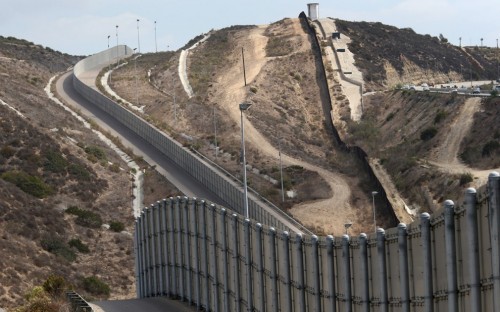Donald Trump’s proposal to build a wall along the southwest border with Mexico would decrease delicate bilateral border security cooperation, set off a new drug war in Mexico, and ultimately increase crime and violence along the frontier, some security analysts contend in an article posted on cnsnews.com.
While the Republican presidential frontrunner’s pledge to build a wall along the 5,525-mile border from California to Texas is the kind of concrete measure his supporters say is needed to block illegal immigration and improve security, others say it may run into the law of unintended consequences.
A Trump presidency would “set back” the neighbors’ security relationship by “20 years,” the Mexican newspaper El Financiero quoted security analyst Alejandro Hope as saying this week.
And writing in the Mexico City daily El Universal, Hope argued that even if the wall is never built, a huge security crackdown by a President Trump making the border impermeable would disrupt illicit drug routes and touch off even more violence between cartels along the Mexican side of the border.
Increased deportations of illegal immigrants by Trump, he said, could end up populating border towns in Mexico with more criminals. And if funds provided to Mexico by the U.S. were cut to pay for the wall, Hope said, that would “inject a lethal dose of distrust,” between security forces on both sides of the border.

This recent Getty Images file photo shows a section of existing border wall near San Diego, Calif. (PHOTO: america.aljazeera.com)
Bilateral relations, he said, would be poisoned with mistrust in a Trump administration. In fact a Trump win would be seen as a “national security threat” in Mexico, added Hope, who formerly held management positions at Mexico’s Center for Investigation and National Security, a civilian intelligence agency.
“The wall would hurt U.S. and Mexican security because it would disrupt the developing cooperation among U.S. and Mexican security agencies,” said Viridiana Rios, a Mexico security expert with The Wilson Center.
“The wall proposal by Donald Trump is not only foolish and impractical, it is offensive to Mexico and detrimental to U.S. business and security interests,” she said in an interview this week.
Increased cooperation between security agencies, carefully nurtured since 2006, would be torn apart by a wall, Rios said.
She contended that a wall would fail to stem the flow of drugs, as Trump maintains. Criminal gangs would “learn to smuggle around it – through tunnels, in balloons and aircraft, in boats,” and by hiding contraband in legal cargo.
“It is a delusion that the wall will stop criminal groups and smugglers,” Rios said. “It will hurt both U.S. and Mexican business and security interests by disrupting legal cooperation.”
Concerns about the Mexico campaign pledge were also raised by a group of GOP national security experts and leaders – 117 at last count – who signed an open letter on March 3 opposing a Trump presidency.
“Controlling our border and preventing illegal immigration is a serious issue, but his insistence that Mexico will fund a wall on the southern border inflames unhelpful passions, and rests on an utter misreading of, and contempt for, our southern neighbor,” the letter stated.
Mexico’s political class hasn’t minced words in expressing its outrage over the wall proposal. Former President Vicente Fox used an expletive to describe it and current President Enrique Peña Nieto has insisted that Mexico won’t pay a single peso towards it.
The question of whether security barriers would work is not a new one. A 2009 Congressional Research Service report asked the same question security analysts are raising today.
“Given the need to coordinate intelligence and law enforcement activities at the border, should maintaining cordial working relationships with Mexico and Canada take precedence over sealing the border with physical barriers?” the study asked.
The CRS report, which examined issues including effectiveness, costs versus benefits, diplomatic ramifications and unintended consequences, in the main part considered barriers along parts of the southwest border, rather than its entire length.
Another CRS report, released in 2014, noted that illegal emigration from Mexico is estimated to be “at a 40-year low,” citing a Pew survey in which experts attributed the decline to factors including the U.S. recession and stepped-up U.S. border security and interior enforcement.
“As migration patterns between the United States and Mexico have changed, many U.S. policy makers have begun to view Mexico as a partner that has an important role to play in securing its southern border and combating Central American transmigration through its territory,” the CRS report said.
By Mark A. Browne for cnsnews.com


Comments are closed.